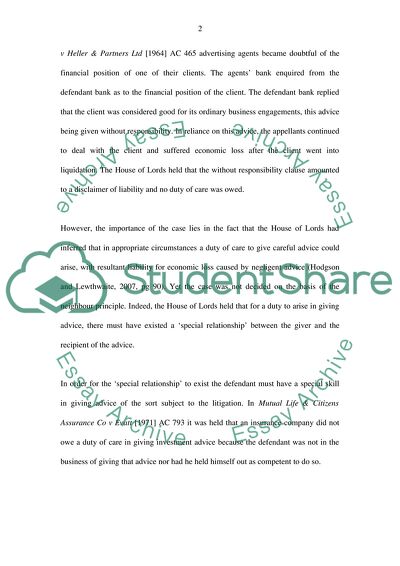
- Home
- Free Samples
- Premium Essays
- Editing Services
- Extra Tools
- Essay Writing Help
- About Us
- Studentshare
- Subjects
- Miscellaneous
- In tort how do the Courts determine whether there is a duty of care in cases of economic loss
In tort how do the Courts determine whether there is a duty of care in cases of economic loss - Essay Example

- Subject: Miscellaneous
- Type: Essay
- Level: Undergraduate
- Pages: 4 (1000 words)
- Downloads: 0
- Author: caleb80
Extract of sample "In tort how do the Courts determine whether there is a duty of care in cases of economic loss"
The plaintiff’s were building a tunnel under a contract with a third party and suffered economic loss. It was held that this was not recoverable. This principle applied in cases where the defendant had made a negligent statement. For example, in Candler v Crane, Christmas & Co [1951] 2 KB 164 the defendant accountants knew that the company’s accounts were to be given to the plaintiff to persuade him to invest. The plaintiff did invest and suffered economic loss as the accounts had been negligently prepared, giving a false impression of the company.
The Court of Appeal held that no duty of care arose in these circumstances where no contractual relationship existed. However, a major change in the law on the recovery of economic loss in cases of negligent statements was soon to come (Cooke, 2007, pg 85). In Hedley Byrne Co Ltd v Heller & Partners Ltd [1964] AC 465 advertising agents became doubtful of the financial position of one of their clients. The agents’ bank enquired from the defendant bank as to the financial position of the client.
The defendant bank replied that the client was considered good for its ordinary business engagements, this advice being given without responsibility. In reliance on this advice, the appellants continued to deal with the client and suffered economic loss after the client went into liquidation. The House of Lords held that the without responsibility clause amounted to a disclaimer of liability and no duty of care was owed. However, the importance of the case lies in the fact that the House of Lords had inferred that in appropriate circumstances a duty of care to give careful advice could arise, with resultant liability for economic loss caused by negligent advice (Hodgson and Lewthwaite, 2007, pg 90).
Yet the case was not decided on the basis of the neighbour principle. Indeed, the House of Lords held that for a duty to arise in giving advice, there must have existed a ‘special
...Download file to see next pages Read MoreCHECK THESE SAMPLES OF In tort how do the Courts determine whether there is a duty of care in cases of economic loss
Law of Tort and Duty of Care
Duty of Care in Negligence
Tort Laws that Covers Civil Cases
Lord Atkins Speech in Donoghue v Stevenson
Tort of Negligence
What Is the Civil Liability Claims System for Negligence Liability in Ireland Criticized for
A Tort Is a Legal Wrong
Law of Negligence - Duty of Care

- TERMS & CONDITIONS
- PRIVACY POLICY
- COOKIES POLICY